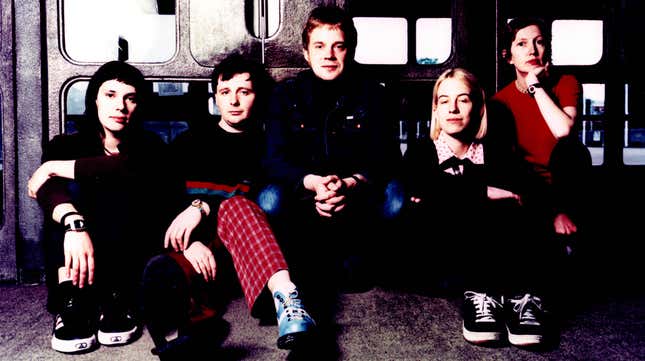
Physical products—or perhaps more specifically, physical formats—weigh heavily in Stereolab’s career, which perhaps is appropriate for a band who lifted their very name from a line of records Vanguard released during the golden age of vinyl. Stereolab’s love of records manifested in how they seemed constitutionally unable to resist an opportunity to release music on any manner of arcane formats. Split singles, limited edition EPs, giveaway flexi discs, Japanese bonus tracks, limited edition soundtracks to art installations—there doesn’t seem to be a format the group hasn’t explored.
Fortunately, their embrace of records extends to compilations, as they’ve never shied away from collecting all these stray tracks on a series they called Switched On. Pulse Of The Early Brain is the fifth installment of Switched On, released a full 30 years after the inaugural volume’s appearance in 1992. That was a busy year for the group, with the founding members Tim Gane and Laetitia Sadier adding drummer Andy Ramsay and vocalist/utility player Mary Hansen shortly after the release of their debut album Peng!. The new members were featured on Low Fi, an EP released in the wake of the original Switched On but which somehow remained orphaned until Pulse Of The Early Brain.
Low Fi is the anchor on Pulse of the Early Brain (Switched On, Volume 5)—the rarity used to lure die-hard collectors but also the center of gravity for the rest of the record. As the title suggests, Low Fi captures Stereolab at their noisy, primitive early peak, churning out a thick cluster of sound where it’s impossible to separate the drone of the Farfisa organ from guitar feedback. All four of the EP’s songs provide variations on this theme, a hypnotic whir that seems unencumbered by the rules of gravity: the analog rumble, synth squiggles, and strummed chords are a collective force onto itself.
There’s a visceral thrill to Low Fi that remains potent, largely because Stereolab swapped force for sophistication after 1993’s Transient Random-Noise Bursts With Announcements. This break isn’t illustrated on Pulse Of The Early Brain, which spends the remainder of its running time picking up stray tracks from the 1990s, adding a few cuts from 2008 for good measure. It’s the flip of last year’s Electrically Possessed (Switched On, Volume 4), where the lion’s share of the 25 tracks dated from the 2000s. Despite this concentration on the 1990s, the only other cut on Pulse Of The Early Brain to suggest the cacophonic roar of Low Fi is “ABC,” a contribution to a 1996 Godz tribute album where the gnarled, fuzzed-out guitar riff hints at hard rock before it gets engulfed by studio trickery.
A fair amount of Pulse Of The Early Brain is devoted to the wonders of a recording studio, or at least a remix. The compilation opens with “Simple Headphone Mind” and “Trippin’ With The Birds,” a pair of tracks from 1997 where Nurse With Wound reshaped an original Stereolab recording into two distinct, open-ended creations in which the group’s Teutonic groove and harmonies are all transformed into ambient texture. Running a collective 31 minutes, the Nurse With Wound collaborations can’t be easily slotted into a sequence, so having them arrive at the front of Pulse Of The Early Brain effectively acts as a palate cleanser, allowing Low Fi to pack a greater punch while also establishing the spacier elements Stereolab reconfigures in appealing fashions on the remainder of the comp.
With its insistent strums giving way to a coda of hooky harmonies, “Robot Riot,” a previously unreleased song written in 2000 for a Charles Long sculpture—he’s the same artist who inspired Music For The Amorphous Body Study Center, the masterful 1995 EP collected on Aluminum Tunes (Switched On, Volume 3)—acts as the bridge between the early and latter-day Stereolab. “Unity Purity Occasional”—the song Long ultimately used—sounds closer to Stereolab’s space-age bachelor pad prime, offering percolating rhythms, retro-futurisms, and ye-ye melodies.
What’s interesting about Pulse Of The Early Brain is how this familiar signature gets scuffed and altered in the margins. Sometimes, the proceedings get tense and nervous, as on the avant-jazz of “Symbolic Logic Of Now,” originally released as part of a split seven-inch single with Soi-Disant in 1998. Occasionally, the compositions are as lush and vivid as they are on “Forensic Itch,” a giveaway from 2008's Chemical Chords that finds Stereolab transposing Smile-era Brian Wilson into a shimmering sci-fi setting. What ties together the disparate material on Pulse Of The Early Brain is how each teems with the energy of discovery, where the emphasis is not on melody or even arrangements—instead, it’s on the serendipitous discoveries of the recording studio, whether it’s the harmonic overtones gained from pushing a needle into the red or hearing Autechre accentuate the sharp electronic angles in his remix of “Refractions In The Plastic Pulse.”
All this attention on texture means that when Pulse Of The Early Brain concludes with a live rendition of “Cybele’s Reverie” performed at the Hollywood Bowl in 2004, Stereolab’s melodic gifts are put in sharp relief. Most of the material on this fifth volume of Switched On studiously avoids the trappings of pop music, so hearing this Emperor Tomato Ketchup single as a coda underscores how Stereolab’s music is the product of careful choices and planned adventure, a combination that often produces compelling results as Pulse Of The Early Brain makes plain.